Exploring the world of AI technology reveals its profound impact on our future. Artificial intelligence is more than just a buzzword; it’s a transformative force across sectors. It’s reshaping how we automate tasks and revolutionizing data analysis in businesses. This technology is advancing in fields like healthcare, manufacturing, and more, leading to significant changes.
What’s striking is how AI harmonizes with innovations like big data, robotics, and the Internet of Things (IoT). This integration opens up a future full of possibilities. It’s clear that AI is not just a tool but a catalyst for change.
Table of Contents

Key Takeaways
- AI technology is transforming various sectors, including healthcare and manufacturing.
- The future of AI promises innovative solutions for everyday problems.
- Artificial intelligence integrates with technologies like IoT and big data for enhanced efficiency.
- The impact of AI extends to creating new job opportunities and evolving existing roles.
- Automation facilitated by AI simplifies complex processes across industries.
Introduction to AI Technology and Its Significance
AI technology marks a significant leap forward in our modern era, reshaping various sectors. Its importance is immense, boosting efficiency and cutting costs across industries. It’s intriguing to see how companies are leveraging AI benefits, freeing up human resources for more creative tasks. This shift allows for a more innovative approach to work.
As technology advances, grasping the importance of AI becomes increasingly vital. Enterprises like IBM are at the forefront of integrating AI into their operations. This strategic move positions AI as a cornerstone for tackling future challenges and seizing new opportunities. It’s crucial for both individuals and organizations to fully understand AI’s role in this evolving landscape.
The Evolution of AI Technology
The journey through the history of AI reveals remarkable advancements and transformative moments. Early developments set the stage for innovative breakthroughs, leading us to the current era characterized by generative AI. Understanding these milestones in AI provides insight into how we interact with technology today.
Historical Milestones in AI
The history of AI is marked by significant achievements. One of the initial milestones in AI occurred in 1951 when Christopher Strachey created a checkers program that demonstrated the potential of machines in problem-solving. Subsequent years saw the introduction of several key developments:
- 1966: Joseph Weizenbaum develops ELIZA, an early natural language processing program.
- 1997: IBM’s Deep Blue defeats chess champion Garry Kasparov, showcasing the capabilities of AI in strategic thinking.
- 2011: IBM Watson wins Jeopardy!, highlighting advances in information retrieval and processing.
- 2016: AlphaGo defeats Go champion Lee Sedol, representing a significant achievement in deep learning.
Generative AI and Its Impact
Generative AI has gained substantial traction, particularly with the introduction of OpenAI’s GPT models in 2018. This technology revolutionizes how we understand and utilize AI. Generative AI generates not only text but also images, audio, and more, drastically expanding the spectrum of applications. This evolution has enabled the creation of tools like ChatGPT, enhancing user interaction and creative expression.

With the ongoing advancements in generative AI, industries are beginning to tap into its potential, altering traditional workflows and driving innovation. As I examine the history of AI and its milestones, the influence of generative AI continues to shape our technological landscape in intriguing ways.
How AI Technology Is Transforming Industries
Artificial Intelligence has become a transformative force across various sectors, fundamentally altering processes and enhancing productivity. Each industry benefits uniquely as AI technologies are integrated into their workflows and operations.
AI in Manufacturing
In manufacturing, AI has revolutionized traditional practices. AI-driven robotic arms significantly boost efficiency, allowing for precision and speed that surpass human capabilities. Predictive maintenance emerges as another critical application, using data analytics to foresee equipment failures. This minimizes downtime and maintenance costs.
AI in Healthcare
The healthcare sector increasingly relies on AI to enhance patient care. From diagnosing diseases more swiftly to improving patient monitoring through virtual assistants, AI is redefining how healthcare professionals interact with and treat patients. This shift leads to quicker, more accurate diagnostics and better overall patient outcomes.
AI in Finance
Within finance, AI plays a pivotal role in enhancing security and operational efficiency. It aids in detecting fraudulent activities through sophisticated algorithms that analyze patterns in transactions. The use of AI in auditing processes streamlines operations, while comprehensive risk assessments ensure better financial decision-making.
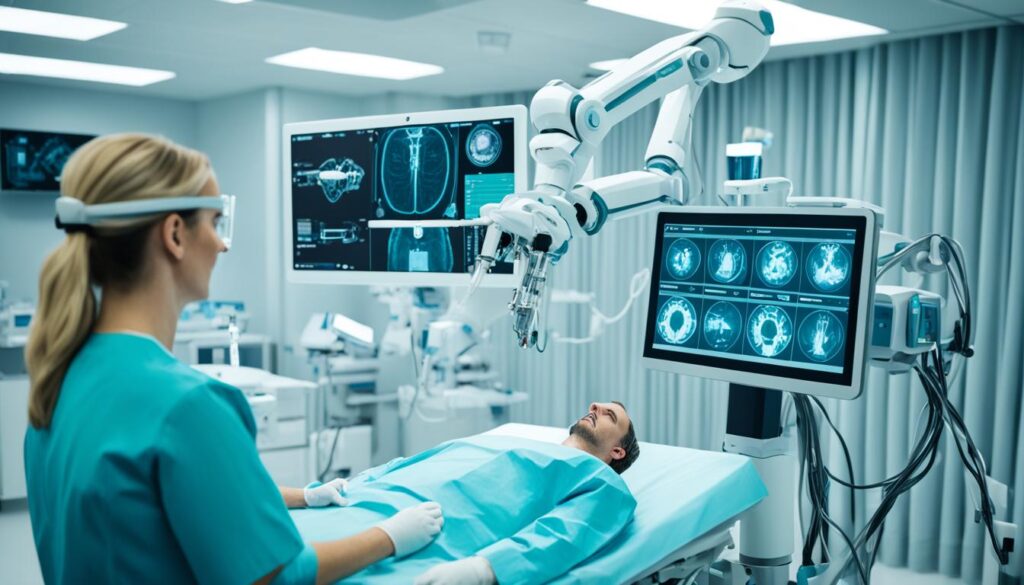
AI Technology in Everyday Life
AI has become essential in our daily routines, making life more convenient and efficient. Smart home technology is a prime example, allowing me to manage my home with a single device. This leads to enhanced comfort and security.
Home Automation and Smart Devices
Smart home technology has transformed how I handle household tasks. Devices like smart thermostats, security cameras, and robotic vacuums make daily chores simpler. For example, a smart thermostat lets me adjust the temperature remotely, ensuring energy efficiency when I’m away.
Home security has also improved with camera systems that provide real-time monitoring through mobile apps. This shows how AI enhances my home’s functionality and security.
AI in Transportation
AI has introduced significant innovations in transportation, making commuting safer and more efficient. Self-driving vehicles are a prime example, using AI to navigate complex environments. AI-enhanced route planning apps also optimize travel times, helping me avoid traffic and reach my destination quicker.
These advancements have changed how I view mobility and travel in my daily life.
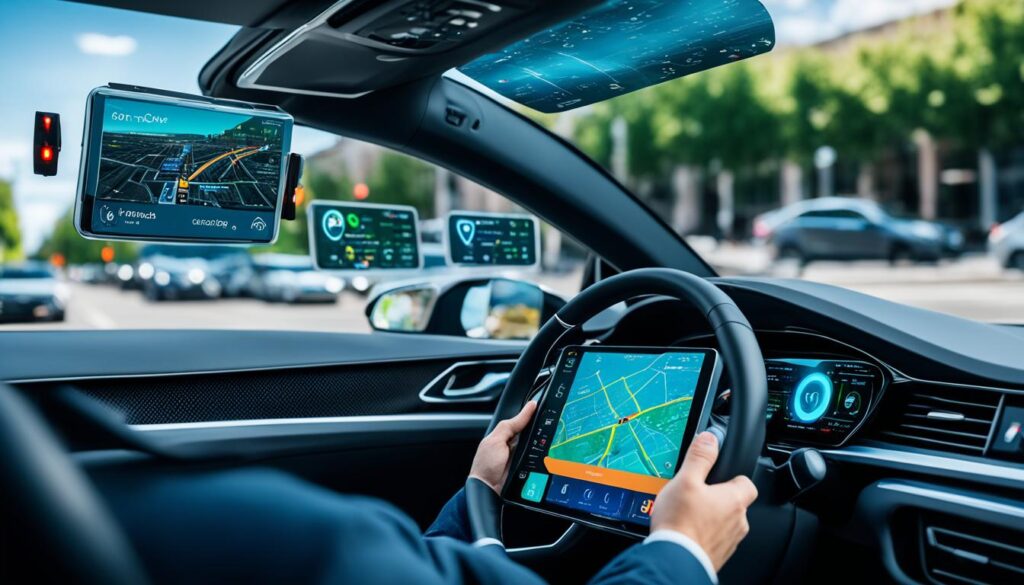
The Role of Machine Learning in Advancing AI
In recent years, machine learning has revolutionized artificial intelligence. It allows systems to learn from data over time, improving their performance without needing explicit programming. This is crucial for understanding AI’s evolution and its innovative solutions in various fields.
Understanding Machine Learning Algorithms
Machine learning algorithms are key to AI systems, enabling them to identify patterns and predict outcomes from input data. There are several types, including supervised, unsupervised, and reinforcement learning. Each type is designed for specific tasks.
- Supervised Learning: This method trains a model on labeled data, aiding AI in making accurate predictions.
- Unsupervised Learning: In this approach, a model learns from unlabeled data, uncovering hidden patterns.
- Reinforcement Learning: This technique educates algorithms through trial and error, aiming to maximize rewards.
Deep Learning and Neural Networks Explained
Deep learning is a subset of machine learning that uses neural networks to mimic human thought processes. It involves multiple layers of interconnected nodes, processing large amounts of data efficiently. This technology is crucial in voice recognition, image analysis, and natural language processing.
Neural networks have an input layer, hidden layers, and an output layer. Each layer processes information, passing it through interconnected neurons. Deep learning models can learn from vast datasets, achieving high accuracy in complex tasks.
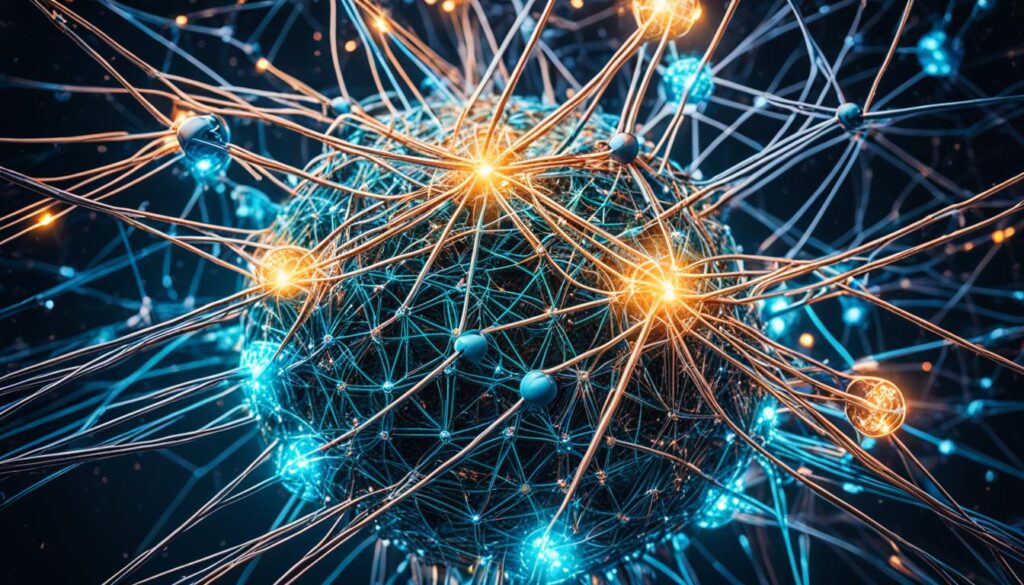
Natural Language Processing and AI
Natural language processing (NLP) is a crucial part of AI technology. It enables machines to understand, create, and respond to human language effectively. Through advanced language models, I can see how these systems improve AI communication and enhance user interactions across various platforms.
Importance of Language Models
Advanced language models are key to NLP’s success. They make technology more accessible and intuitive. These models help AI grasp context, idioms, and nuances, changing how I interact with machines. Thanks to ongoing advancements in natural language processing, human expression’s intricacies are now more understandable.
Applications of NLP in Communication
NLP has many applications in daily communication. For instance, customer service chatbots offer instant help, and automated content generation tools streamline communication workflows. Additionally, sentiment analysis helps businesses understand customer opinions and emotions, boosting customer engagement and satisfaction.

The Emergence of Robotics and Automation
The fusion of robotics and AI is revolutionizing industries at a fundamental level. This technology not only simplifies processes but also introduces unparalleled efficiency and precision across various sectors. As robotics advances, our operational capabilities are significantly enhanced, leading to a paradigm shift in work methodologies.
How Robotics Is Integrated with AI Technology
Robotics has seen remarkable progress with the integration of AI technology. The collaboration between these fields is most apparent in sectors like manufacturing, logistics, and healthcare. Now, intelligent algorithms empower robots to navigate complex environments, process data in real-time, and work alongside humans for enhanced productivity. This partnership showcases how robotics and AI can jointly transform conventional practices.
Impacts on Job Markets
The advent of AI automation presents both opportunities and challenges for the job market. Certain roles, particularly those involving repetitive tasks, are at risk of becoming obsolete due to robotic efficiency. However, there is a growing need for workers proficient in robotics and AI technology. This evolution highlights the importance of upskilling and reskilling the workforce to adapt to new market demands. I firmly believe that embracing these changes can open up new employment opportunities and foster innovation.

Data Analysis’ Evolution with AI Technology
The landscape of data analysis is undergoing a significant transformation with the introduction of AI technology. This evolution empowers organizations to leverage data more efficiently. It enhances both decision-making processes and business intelligence capabilities. I find it fascinating how these advancements can streamline operations and uncover valuable insights that were previously inaccessible.
Enhancing Decision-Making Processes
AI in data analysis plays a critical role in enabling leaders to make quicker and more informed decisions. By analyzing vast datasets, AI models identify patterns and trends that may go unnoticed using traditional methods. This capability not only speeds up the decision-making process but also improves accuracy. Organizations can act swiftly and strategically as a result.
Transforming Business Intelligence
The integration of AI within business intelligence tools revolutionizes how data is reported and visualized. With the support of AI, analytical data becomes easier to interpret. This provides actionable insights that drive strategic initiatives. Organizations can now turn complex reports into digestible visual formats. This enhances understanding and fosters better collaboration among teams.
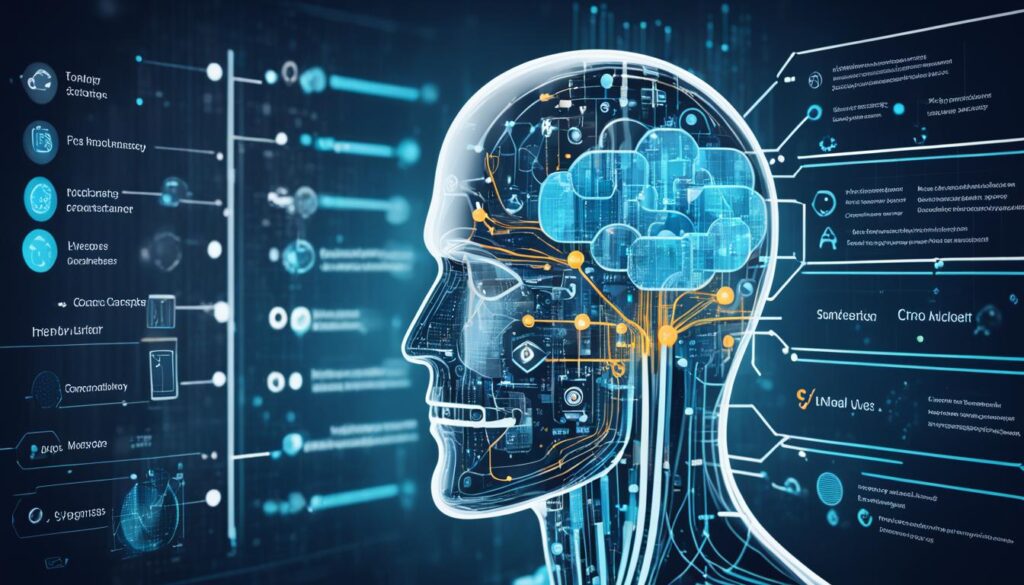
Addressing Ethical Concerns in AI Development
In my journey through AI technology, I’ve realized that ethical considerations are paramount. Ensuring ethical AI practices is vital for building trust with users. This trust relies on transparency in AI and the accountability of developers in addressing biases.
Transparency in AI systems gives users a clear view of decision-making processes. Understanding how algorithms work shows the need for insights into data sources and decision-making. This transparency fosters informed interactions with AI.
AI accountability means acknowledging the potential for harm from AI use. Developers must take ownership of their work, recognizing biases and actively addressing them. For example, in facial recognition or recruitment algorithms, ensuring fairness is crucial to prevent discrimination.
| Ethical Concern | Description | Measures to Address |
|---|---|---|
| Bias in Algorithms | Algorithms may reflect inherent biases present in training data. | Regular audits and diverse training datasets. |
| Transparency | Lack of clarity in AI decision-making processes. | Open documentation and user education initiatives. |
| Accountability | Developers may evade responsibility for negative impacts. | Clear guidelines and ethical standards in AI development. |
AI Technology and Data Privacy Issues
Exploring the intersection of AI technology and data privacy reveals the intricate nature of managing information in our digital era. The swift progress of AI intensifies concerns over how personal data is gathered, kept, and used. It’s crucial to protect consumers’ rights, necessitating rigorous oversight and strict adherence to laws.
Regulatory Challenges and Compliance
Setting clear guidelines for AI is vital to ensure ethical use. The Federal Trade Commission (FTC) closely watches AI companies, highlighting the critical need for compliance in data privacy. Companies face mounting pressure to conform to evolving standards to safeguard consumer data effectively.
Many firms struggle with a complex set of rules, aiming to build robust data governance frameworks. Not meeting these standards can lead to harsh penalties and significant damage to reputation. Therefore, being proactive and understanding regulatory demands is crucial for both new and established companies.
| Aspect | Challenge | Implication for Companies |
|---|---|---|
| Data Collection | Obtaining explicit consent from users | Potential fines for non-compliance |
| Data Storage | Ensuring security and integrity of data | Risk of data breaches leading to lawsuits |
| Data Usage | Adhering to specified purposes | Legal repercussions for misusing data |
Grasping these challenges aids organizations in improving their AI compliance, building trust with consumers, and navigating the complex data privacy regulations landscape.
The Future Job Landscape with AI Technology
Artificial intelligence is transforming the job market at an unprecedented pace. While some jobs may disappear, new ones are emerging, creating new employment avenues. The future will see a shift in the skills needed for success.
New Job Opportunities Created by AI
AI technology is opening up a plethora of new career paths. Roles in data science, machine learning, and designing AI applications are growing swiftly. Those with a deep understanding of AI can look forward to promising career prospects.
- Data Scientists – Specialists who analyze complex data sets to inform decisions.
- Machine Learning Engineers – Experts who create algorithms allowing systems to learn from data.
- AI Application Designers – Innovators developing user-friendly interfaces powered by AI.
Upskilling and Reskilling the Workforce
The rise of AI job opportunities demands a concerted effort in upskilling the workforce. Companies and individuals alike recognize the need to adapt to AI-driven changes. Upskilling ensures that current employees remain relevant in a changing job market.
- Targeted Training Programs – Workshops that focus on key AI-related skills.
- Online Learning Platforms – Resources offering courses in data analytics and machine learning.
- Collaborative Learning Initiatives – Team-based projects promoting hands-on experience with AI technologies.
As AI continues to advance, a strong emphasis on professional development will be crucial. Those who actively engage in upskilling will be well-prepared to seize the opportunities AI technology presents.
AI Technology’s Impact on Climate Change and Sustainability
AI technology is pivotal in the fight against climate change and fostering sustainability. It tackles significant environmental challenges, such as managing resources and tracking emissions, leading to enhanced efficiency. AI facilitates predictive maintenance in industries, significantly cutting down on waste and energy use.
Through AI, organizations can streamline processes across sectors like energy, agriculture, and transportation. Machine learning algorithms sift through vast data sets, uncovering insights that aid sustainable practices. For instance, AI aids farmers in reducing their environmental impact by boosting crop yields while decreasing pesticide application.
AI’s integration with climate change efforts enables more precise ecosystem monitoring. Real-time data analysis predicts weather patterns, tracks biodiversity, and optimizes natural resource management. I am convinced that continued investment in AI will lead to a cleaner, sustainable future, emphasizing environmental responsibility across all industries.
Innovations in AI and Their Societal Implications
The realm of AI innovations is expanding rapidly, exerting profound influence across industries and daily life. As we see advancements in machine learning and natural language processing, the societal impact of AI becomes increasingly complex. It raises significant questions about how these technologies could either enhance our quality of life or introduce new challenges.
In healthcare, AI innovations like predictive analytics are crucial. They enhance patient care and streamline operations. However, the reliance on AI may lead to ethical dilemmas regarding data privacy. Balancing these factors is essential as we navigate the future of technology.
In education, AI innovations offer opportunities for personalized learning experiences. Yet, the societal impact could widen existing disparities if access to technology is unequal. Ensuring equitable access to AI-driven educational tools is paramount as we move forward.
Moreover, in the workplace, AI automation is revolutionizing efficiency. It transforms operations across sectors, presenting a dual challenge in employment. While AI can create new job opportunities, it may displace existing roles. Understanding these dynamics is critical to preparing for the future of technology.
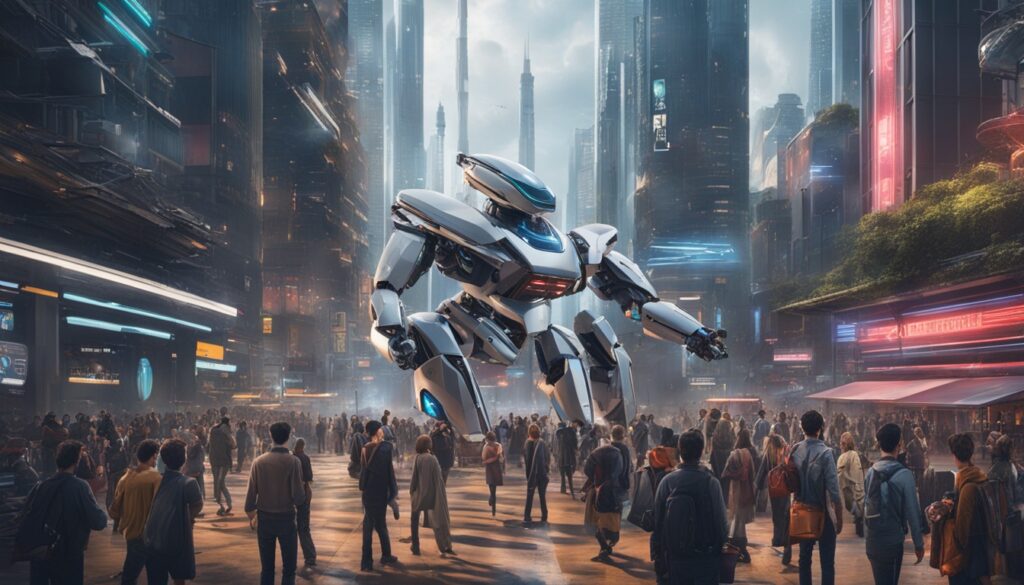
How AI Technology Is Revolutionizing Education
The integration of AI in education is significantly reshaping the learning landscape. Educational technology with AI tailors learning experiences to the diverse needs of students. This personalization creates a more engaging and effective educational environment.
Adaptive learning platforms are a prime example of how technology is transforming education. These platforms analyze student performance in real time. They adjust content and instructional strategies based on individual progress. This method of learning through AI not only enhances understanding but also boosts student motivation by providing challenges that are appropriate for each learner’s level.
AI-driven tools also streamline administrative tasks for educators. Grading, attendance tracking, and resource allocation can be automated. This allows teachers to focus more on engaging with their students. Such administrative efficiency contributes to a more productive learning atmosphere.
The potential for inclusivity is another major benefit of AI in education. Students with disabilities can access tailored instructional materials and supports through AI-powered technologies. This makes education more equitable. In this way, educational technology with AI becomes a vital resource for creating an inclusive learning environment.

| Aspect | Traditional Education | Education with AI |
|---|---|---|
| Personalization | One-size-fits-all | Tailored learning paths |
| Engagement | Lacks interactivity | Interactive and adaptive |
| Administration | Time-consuming | Automated efficiency |
| Inclusivity | Often limited support | Customized supports available |
As I delve deeper into the intersection of AI and education, I see its transformative powers unfolding. It promises a future where learning becomes more accessible and effective.
Streamlining Business Operations with AI Automation
Businesses are increasingly turning to AI automation to boost operational efficiency. This shift allows companies to streamline processes, cut costs, and enhance productivity. By focusing on core activities and outsourcing routine tasks to AI, businesses can optimize their workflows.
AI automation not only boosts productivity but also drives operational transformation with AI. Automating repetitive tasks opens up innovation opportunities. It enables teams to focus on strategic decision-making, leading to improved business efficiency.
- Cost Reduction: Automation of routine tasks leads to significant savings.
- Increased Productivity: Employees can focus on impactful projects.
- Improved Accuracy: AI reduces the risk of human error in data processing.
The following table illustrates some of the most common tasks that benefit from AI automation:
| Task | Description | Benefits |
|---|---|---|
| Data Entry | Automating the input of data into systems | Higher accuracy and time savings |
| Customer Support | Utilizing chatbots for addressing customer inquiries | Round-the-clock support and reduced workloads for human agents |
| Inventory Management | Monitoring stock levels and automating reorders | Reduced stockouts and better inventory planning |
By adopting AI automation, businesses can not only survive but thrive in today’s competitive environment. This transformative approach is crucial for those seeking long-term sustainability and growth.

The Promises of AI in Enhancing Creativity
AI and creativity form a dynamic partnership, reshaping traditional creative boundaries. I am captivated by how AI empowers artists, writers, and designers to expand their creative horizons. These tools generate new ideas, assist in various tasks, and inspire individuals to venture into new creative territories.
The future of creative industries appears bright with AI integration. Sectors like art, music, film, and literature benefit from AI’s creative assistance. AI-driven platforms analyze vast data, uncovering trends and suggesting innovative concepts that humans might miss.
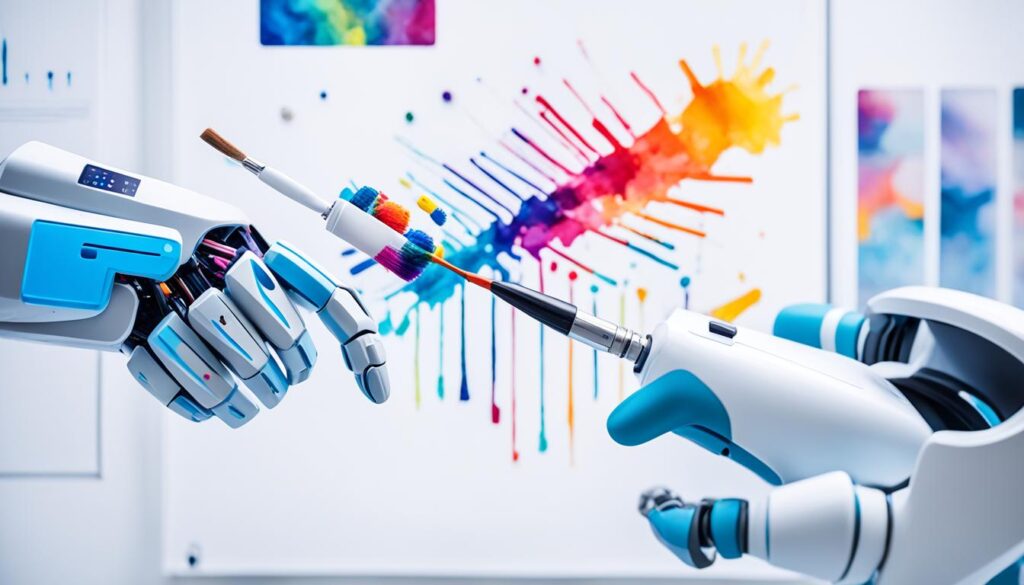
The rapid evolution of AI in creative applications excites me. AI produces artwork, composes music, and helps write compelling narratives. The synergy between human creativity and AI can lead to groundbreaking projects, revolutionizing how we view creative content.
| Creative Application | Description | Example |
|---|---|---|
| Art Generation | AI algorithms create visual art based on patterns and styles | DALL-E |
| Music Composition | AI tools compose original music tracks in various genres | AIVA |
| Content Writing | AI aids in generating articles, stories, or marketing copy | OpenAI’s GPT-3 |
| Game Design | AI assists in creating immersive game environments and characters | Procedural Generation tools |
I eagerly anticipate the impact AI will have on the creative landscape. The possibilities are vast, enabling creative minds to collaborate, experiment, and innovate on an unprecedented scale. This fusion of AI and creativity signals a significant shift for the future of creative industries.
Conclusion
Reflecting on our journey through AI technology reveals its profound impact on our lives, economies, and industries. The future of AI holds vast possibilities, from boosting workplace productivity to transforming healthcare and education. Each step forward brings us nearer to a world where AI and humans work together, achieving extraordinary results.
This summary of AI’s impact underscores both its advantages and the importance of responsible use. Adopting AI requires a deep understanding of its ethical implications, data privacy, and effects on employment. By addressing these issues with care, we can fully benefit from AI while protecting our societal values.
Looking ahead, I am hopeful about AI’s future. With the right strategies, we can use AI to create a better, sustainable world. Embracing AI will lead to a future rich in innovation, creativity, and untapped opportunities.
FAQ
What is AI technology, and how is it shaping our world?
AI technology simulates human intelligence using computer systems. It’s transforming industries by boosting efficiency and driving automation. Through data analysis, it enables better decision-making.
What are some historical milestones in the evolution of AI?
Key milestones include Christopher Strachey’s 1951 checkers program and IBM’s Deep Blue defeating Garry Kasparov in 1997. The rise of generative AI models like OpenAI’s GPT in 2018 has also been pivotal, changing how we interact with computers.
How is AI used in manufacturing and healthcare?
In manufacturing, AI uses robotic arms for better operational efficiency and predictive maintenance. In healthcare, it helps diagnose diseases faster and improves patient monitoring with virtual assistants.
Can you explain the role of machine learning and deep learning in AI?
Machine learning lets systems learn from data and get better over time. Deep learning, using neural networks, mimics human thought processes. This enables advanced tasks like voice recognition and image analysis.
What is natural language processing (NLP), and why is it important?
NLP is a part of AI that deals with how computers understand and generate human language. It improves conversational AI, making tech more user-friendly. This is crucial in applications like customer service chatbots and sentiment analysis.
How does AI impact job markets?
The growth of robotics and automation brings both challenges and opportunities. While some jobs may decline, there’s a growing need for skilled workers in AI and data science. This requires upskilling the workforce.
What are the ethical considerations surrounding AI development?
Ensuring AI is used responsibly is vital. Transparency builds trust, and accountability helps fix biases in AI systems. These ethical standards are crucial for AI development.
How is AI technology related to data privacy regulations?
As AI advances, data privacy becomes a major concern. There are regulatory hurdles around data collection and use. This leads to the need for strong laws to protect consumer rights and uphold ethical standards.
What new job opportunities are being created by AI?
AI is creating jobs in data science, machine learning engineering, and AI app development. It’s expanding career options in the tech sector.
How does AI contribute to sustainability and climate change initiatives?
AI can help tackle climate change by managing resources efficiently and predicting maintenance needs. Its applications can support sustainable practices, potentially reducing emissions across sectors.
In what ways does AI technology transform education?
AI personalizes learning, making it more engaging through adaptive platforms. It also boosts administrative efficiency. This leads to more inclusive and customized educational settings.

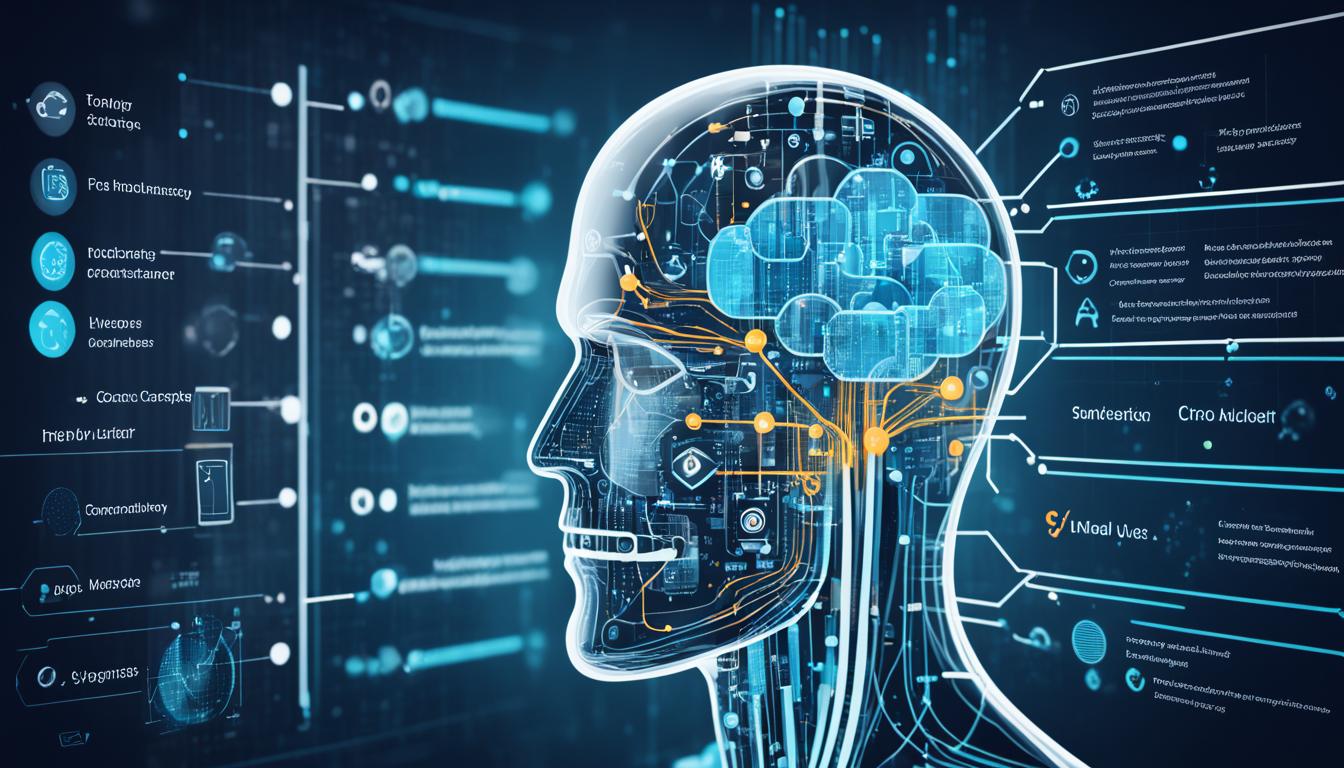


Pingback: Navigating Trends in Information Technology
Pingback: Exploring the World of AI Technology
Pingback: Master AI Top-Rated Artificial Intelligence Course